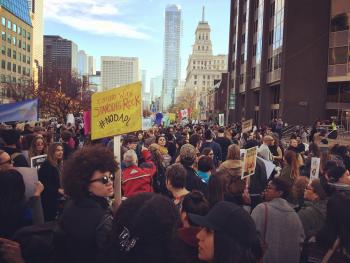On the sunny afternoon of November 5, supporters gathered in Toronto to answer the global call to action to join the Indigenous-led movement to stop the Dakota Access Pipeline (DAPL).
Since the Standing Rock Sioux Nation first took legal action on July 27, 2016 to stop the 1886-km crude oil pipeline that threatens their water supply and sacred territory, the movement has gained significant attention and momentum.
The peaceful march in Toronto starting from Queen's Park harnessed the solidarity of an estimated 4,000 Indigenous and settler activists. This rally was a momentous opportunity to collectively express outrage for the contentious pipeline and demonstrate love for the brave land and water protectors in North Dakota.
The march itself had clear aims -- to publicly call out the major Canadian banks (TD, RBC, and Scotia Bank) funding the pipeline and to march past the U.S. consulate and City Hall. The presence of support for #NoDAPL in Toronto reinforces the message to private industries and the U.S. and Canadian governments: the world is watching.
This moment of resistance in Indigenous history resonates with the realities of many living within the borders of the settler-colonial state of Canada. The rally in Toronto was a key opportunity to raise awareness and bring into conversation interrelated issues that warrant attention from the public and from the Canadian government.
"Honor the treaties!"
The indifference for the Great Sioux Nation's sovereignty over unceded territory and their right to protect this land begins with the American government and private industry's disregard for the 1851 Treaty of Fort Laramie. Despite the fact that land and water protectors have been arrested for trespassing on the DAPL construction site, this treaty recognizes these lands as Sioux homeland.
First Nations people in Canada are no strangers to the lack of action on Indigenous treaty rights. While the current Liberal government speaks of a nation-to-nation relationship, there's concern that treaties will continue to be ignored. Respect for First Nations sovereignty and ownership over their own lands begins with respect for treaties. As Mi'kmaw lawyer Pamela Palmater explained earlier this year on rabble.ca, "The health of our planet and future generations depends on us taking our role as the real governing power seriously."
The message to honor the treaties was strong Saturday afternoon -- all peoples in Canada have treaty obligations that include respect for Indigenous self-governance and sovereignty over land.
"Water is life! You can't drink oil!"
"I just want to give a shout out in our own country to Justin Trudeau -- I want to say keep your damn word!" Algonquin elder Patti Pettigrew shouted to the crowd of supporters in Queen's Park referring to the Prime Minister's promise to address First Nations water issues.
Sovereignty and the protection of water and land are inseparable. Protecting drinking water is at the heart of the #NoDAPL movement because of the threat of a pipeline leaking contaminants into nearby water sources. Whether it's the continued lack of access to this basic human right, or the imminent threat of poisoned water sources due to ongoing settler-colonial projects, issues of contaminated water run deep for many First Nations in Canada.
Health Canada's recent report on water contamination in First Nations communities in Canada (excluding British Columbia) speaks to the enormity of the issue -- since the end of September this year, 94 communities have been under 139 boil water advisories.
Trudeau's promise to fix this problem within the next five years is under scrutiny by First Nations leaders who question the feasibility of the plan. The level of commitment needed to provide all communities with drinkable water requires an openness to addressing complex and costly infrastructure issues that are currently unaccounted for by the federal government.
Settler colonial expansion projects continue to threaten the health of many Indigenous peoples in Canada. Including how the population of Grassy Narrows First Nation in Northern Ontario is facing mercury poisoning due to a chemical paper mill, and the threat of mercury contamination in the fish supply of local Inuit in Labrador because of the Muskrat Falls hydroelectric dam project. These are just two of the many current cases of environmental racism that affect access to clean water.
A moment of collective awareness
The rally in Toronto was a moment of solidarity with protectors in North Dakota -- but it was also an opportunity to bring into conversation a multitude of interrelated issues happening closer to home. While treaty obligations and the issue of water insecurity are briefly highlighted here, these were just two among many matters of concern that were highlighted by organizers and supporters.
Standing in solidarity with Standing Rock raises awareness on the part private industries and governments play in continuing settler colonial violence and expansion. The bringing together of Indigenous and settler activists from diverse backgrounds provided an important space to learn, make connections, share concerns, support Indigenous resistance movements, and confront colonialism in the U.S. and Canada. This is a collective awareness necessary to fuel probable resistance to recent President-elect Donald J. Trump's scary resource extraction policies and to hold Trudeau accountable to his promises.
Melissa A. Forcione is a settler PhD student in Human Geography at Queen's University. As an academic activist, she studies the decolonization of public education and is interested in researching and writing about Indigenous-settler relations in Canada.
Please chip in to keep stories like these coming.
Photo: Melissa A. Forcione




Comments
Do
Don't